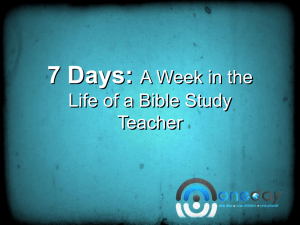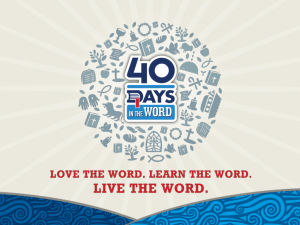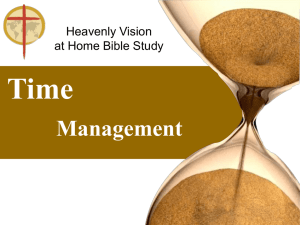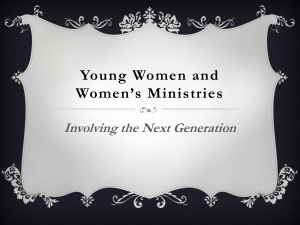Conceptual Models for Sunday School - Connect
advertisement
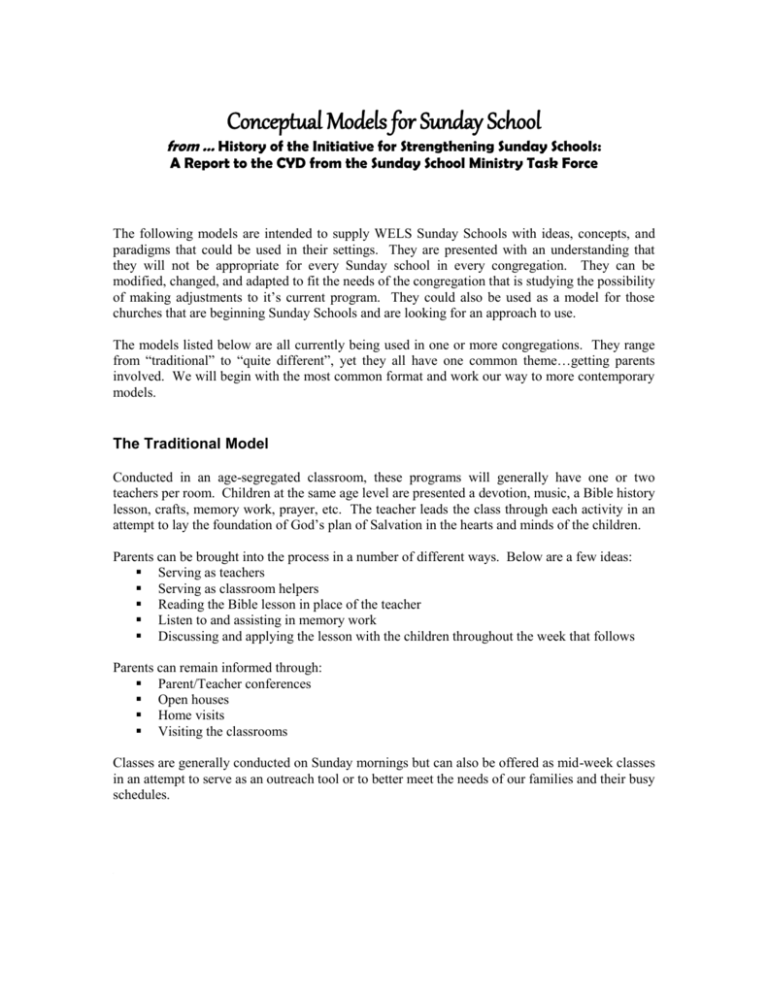
Conceptual Models for Sunday School from … History of the Initiative for Strengthening Sunday Schools: A Report to the CYD from the Sunday School Ministry Task Force The following models are intended to supply WELS Sunday Schools with ideas, concepts, and paradigms that could be used in their settings. They are presented with an understanding that they will not be appropriate for every Sunday school in every congregation. They can be modified, changed, and adapted to fit the needs of the congregation that is studying the possibility of making adjustments to it’s current program. They could also be used as a model for those churches that are beginning Sunday Schools and are looking for an approach to use. The models listed below are all currently being used in one or more congregations. They range from “traditional” to “quite different”, yet they all have one common theme…getting parents involved. We will begin with the most common format and work our way to more contemporary models. The Traditional Model Conducted in an age-segregated classroom, these programs will generally have one or two teachers per room. Children at the same age level are presented a devotion, music, a Bible history lesson, crafts, memory work, prayer, etc. The teacher leads the class through each activity in an attempt to lay the foundation of God’s plan of Salvation in the hearts and minds of the children. Parents can be brought into the process in a number of different ways. Below are a few ideas: Serving as teachers Serving as classroom helpers Reading the Bible lesson in place of the teacher Listen to and assisting in memory work Discussing and applying the lesson with the children throughout the week that follows Parents can remain informed through: Parent/Teacher conferences Open houses Home visits Visiting the classrooms Classes are generally conducted on Sunday mornings but can also be offered as mid-week classes in an attempt to serve as an outreach tool or to better meet the needs of our families and their busy schedules. . The Traditional Plus Model This model is very similar to the traditional model, with one key exception. In this model the parents are brought into the classrooms with the children and participate fully with them. The teachers still presents the lesson and leads the activities, but with the parents present. The advantage to the program is the parent’s connection with the lesson and the opportunity to apply the Bible truth with events that take place in the life of the family. Application of the lesson can be carried out throughout the week as the teaching moments present themselves. It should be noted that this model can been seen as intimidating by some teachers as they are now teaching with other adults in the classroom. The “Family Sunday Event” Model This model follows the traditional approach every Sunday of the month but one. On that Sunday parents and children stay together for a special program or event. The event can include a missionary discussing his or her ministry experiences, presentations by various areas of ministry within the congregation (outreach committee, youth group, etc.) and outside of it (WELS Kingdom Workers, Christian Life Resources, etc.), a Bible game day, etc. The emphasis on the event day is families focusing on ministry and God’s Word together. This model can bring excitement to the program and increase a child’s enthusiasm for ministry. The Family Bible Hour Model – Version 1 In this Family Bible Hour model parents and children are gathered together for certain elements of the learning session, namely the introduction of the lesson, opening and closing prayers, and music. Children are dismissed to their classrooms and adults to Bible study. Classrooms are then conducted in a manner very similar to the traditional model listed above. Children in classrooms will learn a Bible history lesson or Bible teaching and the parents will review the same lesson in their gathering. The children may also write the closing prayer for the day, report back to the larger assembly on the key points of the lesson, etc. One congregation using this model will do a monthly “family event” that keeps the larger group together for the entire learning session. During this family event they focus on music, skits, a Bible lesson, activities, small group discussions, prayers, etc. An emphasis in this model, as well as the upcoming family models, is placed on the application of the Bible teaching to the lives of the children. Again, parents come across many teachable moments with their children each week. Learning and discussing the same Bible lessons will allow them to apply the truths of God’s Word to these situations daily. . The Family Bible Hour Model – Version 2 This model is designed to make use of the Christ-Light curriculum in a family setting. It is best used in congregations where a large proportion of the children attend the Lutheran Elementary School and are studying God’s Word through Christ-Light. In this model families gather together for the entire learning session on Sunday mornings. It opens in a large group setting with a brief introduction of the theme for the week. A hymn or song related to that theme is sung, and the large group then reviews the A and B lessons that were taught in the LES the previous week. (Families with children not attending the LES will be supplied with the lessons and asked to review them together at home prior to the Sunday gathering). After this brief review, the Bible teaching contained in the C lesson is introduced and read from Scripture. The large groups will then break into family units and work through the questions in the C lessons that apply to the Bible lesson. In essence, the parents become the teachers at this point and the large group leader assists them, as they need it. Following the lesson review the families will be presented with several “real life situations” and asked to discuss them in light of the Bible teaching they just worked through together. The sessions are closed with more music and a closing prayer. The emphasis in this model is on families learning together with the context of the current curriculum. It is important to know that the C lessons were not necessarily designed for this purpose and will need to be adjusted to fit the sessions. A good deal of planning and coordination is needed in this approach. The Family Bible Hour Model – Version 3 Model 3 is the model that many would see as being “quite different”. Like Model 2 it brings the family together for the entire learning experience. Sessions tend to be 1 ½ hours in length and include work in both large and small groups. Lessons revolve around a central theme that is repeated many times throughout the session. The focus is generally on one Bible teaching, with the lesson, music, memory work, and application all focused on a single verse. A good deal of music is involved in the learning process, as is a high energy lesson, quiz shows that the parents and children participate in, skits, groups prayers, and videos. The WELS does not currently produce a curriculum that fits this model, but one is available from sources that can be adapted. Families are connected in the small group sessions that focus on each individuals “highs and lows” from the previous week, applications of the key point, and the constant repetition of the theme verse. Families also spend a good deal of time together in prayer. Family devotions based on the theme verse may also be used throughout the week. This model requires a great deal of time to coordinate and may need minor doctrinal editing. It places an emphasis on using God’s Word to change people hearts and lives, as they grow together as families in their sanctified lives.

